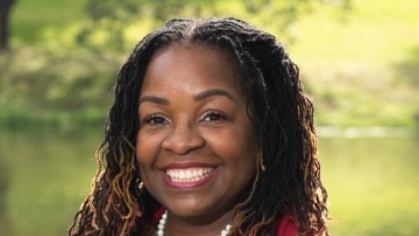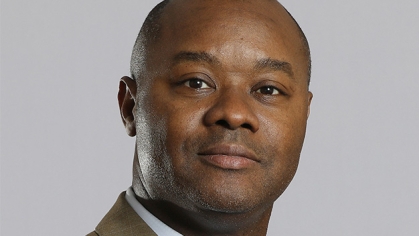Rutgers University (and more specifically, Rutgers University - Newark) has gained a reputation around the country as a social justice leader in higher education. That reputation is what brought current Rutgers School of Criminal Justice Associate Professor Sarah Lageson to the Garden State.
Lageson, who’s work has been featured in national publications such as the New York Times, Washington Post, CNN, and The Guardian amongst others, was honored in late 2021 with the prestigious Michael J. Hindelang Outstanding Book Award from the American Society of Criminology (ASC). According to the ASC, the Hindelang Award is “given annually for a book… that makes the most outstanding contribution to research in criminology.”
“It was really exciting,” recalled Lageson. “It means a lot to be recognized by people in my field that I really admire. A lot of the past award winners have books that were integral in my own research. So it felt really great to be honored by people that I respect so much.”
Her most recent book, Digital Punishment: Privacy, Stigma, and the Harms of Data-Driven Criminal Justice, dives into how personal data is collected by police jurisdictions - and distributed online through the private sector - when one is arrested, and the long-lasting effects that can have.
“[Digital punishment] started as my dissertation topic,” said Lageson. “I was studying the collateral consequences of having a criminal record and was realizing that a lot of what people were having to deal with wasn’t just having a legal conviction record, but it was having all of these other types of criminal records that were showing up on background checks and on the internet."
Lageson points out that this effects a large amount of the population across the country. Approximately 10 million people are arrested in the US every year, and many jurisdictions put the arrest information online. That information not only lives online, but is often obtained by private sector companies. This leads to a great deal of consequential information online - of which many that are affected are unaware - that can have significant impacts on everyday life, extending through background checks to one’s ability to find a job and affordable housing. That information can live online years after processing, even if the crime was considered minor or there was an acquittal.
Additionally, Lageson’s research expands upon what many in criminology already understand: that racial inequality in policing is rampant, and that it can have even further-reaching effects through digital punishment.
“These data practices essentially amplify and perpetuate racial inequality. So we can look at the inequalities that exist in the system based on policing and practice, judicial discretion, and the way that certain laws are written. My research showed how the extra-legal consequences of digital punishment really reinforce and exacerbate the inequalities that are in the legal system itself,” said Lageson.
Lageson has had an opportunity to speak directly with New Jersey lawmakers about her research and ways to move forward, including a report on digital punishment and bad data practices for the office of the Governor. She has also collaborated with the State Assembly. Her research has often been cited as they were considering expanding expungement over the last few years.
Rutgers’ reputation - and resources - have had a profound impact on Lageson’s research.
“I came to Rutgers specifically because I knew that it was a social justice-oriented university,” remembered Lageson. “The School of Criminal Justice is very committed to public criminology, meaning publicly engaged work. So there was a lot of support around me from people in my department to think about this from different angles: to reach out to different groups or different people. I also had a book workshop at Rutgers-Newark so I was able to sit in a room with a bunch of people who had read the research and provide feedback on it.”
Lageson later added: “The trust that other agencies have for Rutgers - the fact that the ACLU and the New Jersey Re-entry Corporation, and Volunteer Lawyers for Justice, were all really excited to support the project - because they know that Rutgers has this commitment. I think that having Rutgers’ support and the network surrounding Rutgers has really helped this research and transform it into something that is more actionable.”
It is that connection to the community, and Rutgers-Newark’s role as an anchor institution for the Brick City, that carried through Lageson’s work. In fact, many of whom that were interviewed for her research lived in Newark and were assisted by Lageson and her team with their criminal records.
“A big part of the study was helping people get access to their state rap-sheets and criminal records, so we would do that in Newark and they would bring their paperwork over and we’d sit down and work on it. To be in the city and build trust with the community and the community groups that were helping me do the research and being on the campus was really helpful,” stated Lageson.
The support that the School of Criminal Justice has offered Lageson, including Dean Bill McCarthy, has helped make this honor even more special.
“[Dean McCarthy] called me immediately and was so supportive. He had actually won this award a few years back, so it was really neat to celebrate and share that with him. I also got a lot of wonderful messages from other faculty at SCJ. It’s really a wonderful community.”
Lageson now hopes that her research into digital punishment helps open the door for more questions regarding how we as a society view criminal records and the lasting impact they can have on one’s life.
“The big question is how far do we want punishment to go,” said Lageson. “This only happens in America - it does not happen in other countries - where people are punished from the moment they are arrested until decades after it’s over, and the internet has really amplified that process. So we may want to think differently about how the private sector uses criminal records and how we can convert criminal records, and if they should really be used as a tool to discriminate against people for their entire life.”



